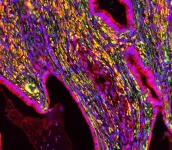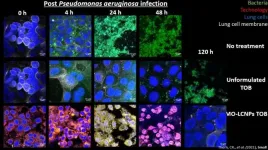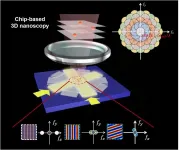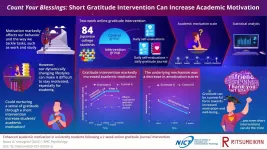INFORMATION:
This work was funded NHMRC, Cancer Institute NSW and PanKind (The Australian Pancreatic Cancer Foundation).
Scientists show how to attack the 'fortress' surrounding pancreatic cancer tumors
2021-05-13
(Press-News.org) UNSW medical researchers have found a way to starve pancreatic cancer cells and 'disable' the cells that block treatment from working effectively. Their findings in mice and human lab models - which have been 10 years in the making and are about to be put to the test in a human clinical trial - are published today in Cancer Research, a journal of the American Association for Cancer Research.
"Pancreatic cancer has seen minimal improvement in survival for the last four decades - and without immediate action, it is predicted to be the world's second biggest cancer killer by 2025," says senior author Associate Professor Phoebe Phillips from UNSW Medicine & Health.
"But our latest advance means today I am the most optimistic and hopeful I have been in my career."
Pancreatic cancer is notoriously difficult to treat because of the dense scar tissue surrounding tumours - the tissue acts like a fortress that blocks chemotherapy delivery.
"This scar tissue is produced by critical 'helper cells' - also called cancer-associated fibroblasts - which cancer cells recruit to support their growth and spread. Yet, these helper cells have been ignored in current treatment strategies," A/Prof. Phillips says.
"Our approach hits both the tumour cells and the helper cells, so it's ideal for overcoming the aggressiveness and drug resistance of the disease."
In today's paper, the team demonstrates their novel way to metabolically rewire helper cells by targeting one particular protein called SLC7A11, which in turn shuts off the cells' tumour-promoting activity and reduces the scar tissue they produce.
"We found that switching off SLC7A11 in mice with pancreatic tumours directly killed pancreatic cancer cells, reduced the spread of tumour cells throughout their body and decreased the scar tissue fortress," says Dr George Sharbeen, a postdoc researcher in A/Prof. Phillips' lab who led the experimental work.
Comprehensive models, in-depth study
SLC7A11 has been studied in pancreatic cancer cells before, but this is the first piece of research to show that it plays a critical role in non-tumour helper cells, too.
"In other words, we have identified a novel 'dual cell' therapeutic target - tackling both the tumour cells and their helpers - which overcomes the current limitations of standard chemotherapy." The team used several complementary models to improve the clinical translatability of their findings, including patient-derived pancreatic cancer cell lines and helper cells, 3D at-the-bench models including an explant model that maintains pieces of human pancreatic tumour tissue, and multiple mouse models of pancreatic cancer.
"We also used our cutting-edge nanomedicine we developed in a multi-disciplinary collaboration with engineers - UNSW Professor Cyrille Boyer and University of Queensland Professor Thomas Davis - to deliver a gene therapy to inhibit SLC7A11. This therapy is advantageous because our nano-drug is tiny and able to penetrate the scar tissue in pancreatic cancer," co-first author Associate Professor Joshua McCarroll from the Children's Cancer Institute says.
Clinical trial about to commence
The team's findings have formed the foundation for a clinical trial led by A/Prof. Phillips and UNSW Medicine collaborator Professor David Goldstein, which was funded by a recently awarded Cancer Institute NSW Translational Program Grant.
"In this trial, we will repurpose an anti-arthritis drug called sulfasalazine - which we know potently inhibits SLC7A11 - for the treatment of pancreatic cancer patients with tumours that have high SLC7A11 levels, which we've shown to be the case in more than half of patients. It has the potential to improve treatment response and ultimately survival of these patients," A/Prof. Phillips says.
The researchers say the opportunity to repurpose an existing drug that's already in the clinic will help them make progress more quickly.
"Using an approved drug has allowed us to get this piece into the clinic much faster than what would be the case if we started from scratch with drug development, too," says A/Prof. Phillips.
"We are taking this exciting development all the way from the lab bench through to the clinic with the sole purpose of improving outcomes for patients with pancreatic cancer."
The research team hopes to analyse and publish the first set of results of the trial within three years.
Improving outcomes that haven't changed in decades
In addition to the clinical trial, the team now hopes to assess how their approach interferes with the exchange of nutrients between tumour cells and helper cells. They also want to identify the ideal drugs to combine with their therapeutic approach to enhance anti-tumour effects.
Pancreatic cancer is a highly lethal disease, with only one in 10 patients surviving beyond five years. In 2020, an estimated 4000 Australians were diagnosed with pancreatic cancer - about 90 per cent of them will die, often within a few months of diagnosis.
"We clearly need improved treatments to turn these dismal statistics around, and we hope clinical translation of our findings will ultimately increase the number of pancreatic cancer survivors," says A/Prof. Phillips.
"We will not give up until we improve the quality of life of patients and provide them with an effective treatment."
ELSE PRESS RELEASES FROM THIS DATE:
Pandemic stigma: Foreigners, doctors wrongly targeted for COVID-19 spread in India
2021-05-13
The Indian public blamed foreigners, minority groups and doctors for the rapid spread of COVID-19 across the country during the first wave, due to misinformation, rumour and long-held discriminatory beliefs, according to an international study led by Monash University.
This resulted in people refusing to get tested for fear of humiliation or public reprisals, which included attacks on Muslims and health care workers.
However, when presented with accurate and reliable information about the virus spread, the Indian public back-pedalled on those negative sentiments and were more likely to get tested and seek medical help, highlighting the importance of health advice from credible sources.
A ...
Novel nanotech improves cystic fibrosis antibiotic by 100,000-fold
2021-05-13
World-first nanotechnology developed by the University of South Australia could change the lives of thousands of people living with cystic fibrosis (CF) as groundbreaking research shows it can improve the effectiveness of the CF antibiotic Tobramycin, increasing its efficacy by up to 100,000-fold.
The new technology uses a biomimetic nanostructured material to augment Tobramycin - the antibiotic prescribed to treat chronic Pseudomonas aeruginosa lung infections in severe cases of CF - eradicating the infection in as little as two doses.
In Australia, cystic fibrosis (CF) affects one in 2500 babies - or one baby born every four days - causing severe impairments to a person's ...
Study: Obesity slows progress against cancer deaths
2021-05-13
Cancer death rates have fallen dramatically in the United States, but factor in obesity, as researchers did at the University of North Carolina Gillings School of Global Public Health, and the picture changes.
In a study published May 10 in JAMA Network Open, researchers showed that obesity-related cancer deaths are improving, but at a slowing pace.
Based on mortality data for 50 million people, deaths from cancers not associated with obesity -- that's lung cancer and skin cancer, among others - are declining at a rate almost three times faster than cancers linked to obesity, such as stomach, colorectal, uterine, thyroid and postmenopausal breast cancer.
"These are cancers where we could see even larger mortality improvements with creative and practical tools to combat ...
Can the diffraction limit overcome in the linear imaging system?
2021-05-13
Compared with the superresolution microscopy that bases on squeezing the point spread function in the spatial domain, the superresolution microscopy that broadens the detection range in the spatial frequency domain through the spatial-frequency-shift (SFS) effect shows intriguing advantages including large field of view, high speed, and good modularity, owing to its wide-field picture acquisition process and universal implementation without using special fluorophores labeling.
To enable spatial-frequency-shift microscopy with a superresolution at the subwavelength scale, it is essential to use the near-field evanescent wave with a larger wave vector than the far-field propagation wave for illumination, which can be built on the integrated photonics, paving the way for compact ...
A new polarized fluorescent probe for revealing architectural dynamics of living cells
2021-05-13
Researchers from Tokyo Medical and Dental University (TMDU), collaborating with scientists from the Marine Biological Laboratory (MBL) and RIKEN, develop a novel technique for live-cell fluorescent imaging which leads them to discover a new actin structure in starfish early embryos.
Tokyo, Japan - Monitoring alignments of the building blocks of cells is important to understand how the cells are built. By collaborating with imaging scientists at the MBL, researchers from Japan have developed a new probe which they call POLArIS, allowing real-time imaging of molecular orientations in live cells.
A fluorophore emits polarized light as it glows. The orientation of polarized fluorescence ...
Count your blessings: Short gratitude intervention can increase academic motivation
2021-05-13
It is difficult for us to succeed in whatever we set out to do if we lack motivation. We usually need it as a driving force to achieve both short- and long-term goals, from household chores to getting a degree. However, because of the ongoing pandemic, our lifestyles have been subjected to drastic and dynamic changes, and many work- and study-related activities are now carried out online exclusively. This, among other complex factors, have made it difficult for some people to stay focused and motivated, and psychology researchers are trying to find effective and widely applicable solutions to address such problems.
In a END ...
Dental procedures during pandemic are no riskier than a drink of water
2021-05-13
COLUMBUS, Ohio - A new study's findings dispel the misconception that patients and providers are at high risk of catching COVID-19 at the dentist's office.
SARS-CoV-2 spreads mainly through respiratory droplets, and dental procedures are known to produce an abundance of aerosols - leading to fears that flying saliva during a cleaning or a restorative procedure could make the dentist's chair a high-transmission location.
Ohio State University researchers set out to determine whether saliva is the main source of the spray, collecting samples from personnel, equipment and other surfaces reached by aerosols during a range ...
Health effects of prenatal exposure to 1994 genocide against the Tutsi in Rwanda
2021-05-13
Twenty-seven years ago, more than 1 million Rwandans were killed during the genocide against the Tutsi in Rwanda from April 7 to July 4, 1994. It is estimated that 100,000 to 250,000 women were raped during the 100-day genocide, and that 10,000 children were born as a result. A new study finds that Rwandans who were conceived by mothers who survived the 1994 genocide against the Tutsi have poorer adult health outcomes than those who were conceived by Rwandan mothers living outside the country at that time. In addition, those who were conceived through genocidal rape have poorer adult health ...
Obesity during adolescence linked to increased risk of stroke as an adult
2021-05-13
DALLAS, May 13, 2021 -- Higher body mass index (BMI) in adolescence is associated with a significantly higher risk of first ischemic stroke in adults under age 50 regardless of whether they had Type 2 diabetes, according to new research published today in Stroke, a journal of the American Stroke Association, a division of the American Heart Association.
While rates of adolescent obesity and stroke among adults under the age of 50 years continue to rise around the world, the precise link between the two conditions is still not fully understood.
"Adults who survive stroke earlier in life face poor functional outcomes, which can lead to unemployment, depression and anxiety," said study co-author Gilad Twig, M.D., M.P.H., Ph.D., an ...
Largest-ever study of artificial insemination in sharks--and the occasional 'virgin birth'
2021-05-13
It's a tough time to be a shark. Pollution, industrialized fishing, and climate change threaten marine life, and the populations of many top ocean predators have declined in recent years. In addition to studying sharks in the wild, scientists working to save sharks rely on ones living in zoos and aquariums so that they can help build breeding programs and learn more about the conditions sharks need to thrive. One important way the scientists do that is by playing matchmakers to the sharks, pairing up individuals in ways that increase genetic diversity. In a new study in Scientific Reports, scientists undertook the largest-ever effort to artificially inseminate sharks.Their work resulted in 97 new baby sharks, ...




